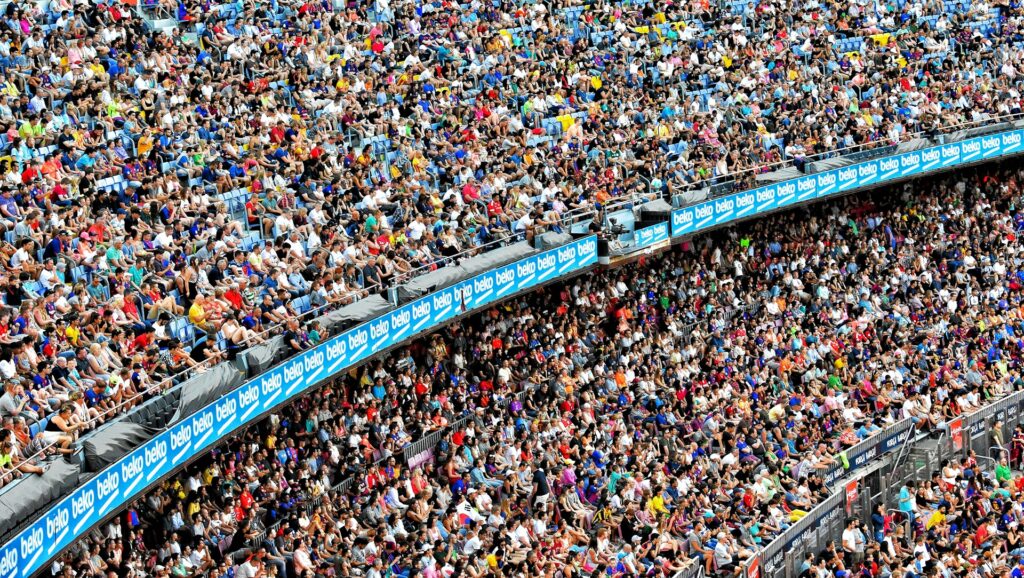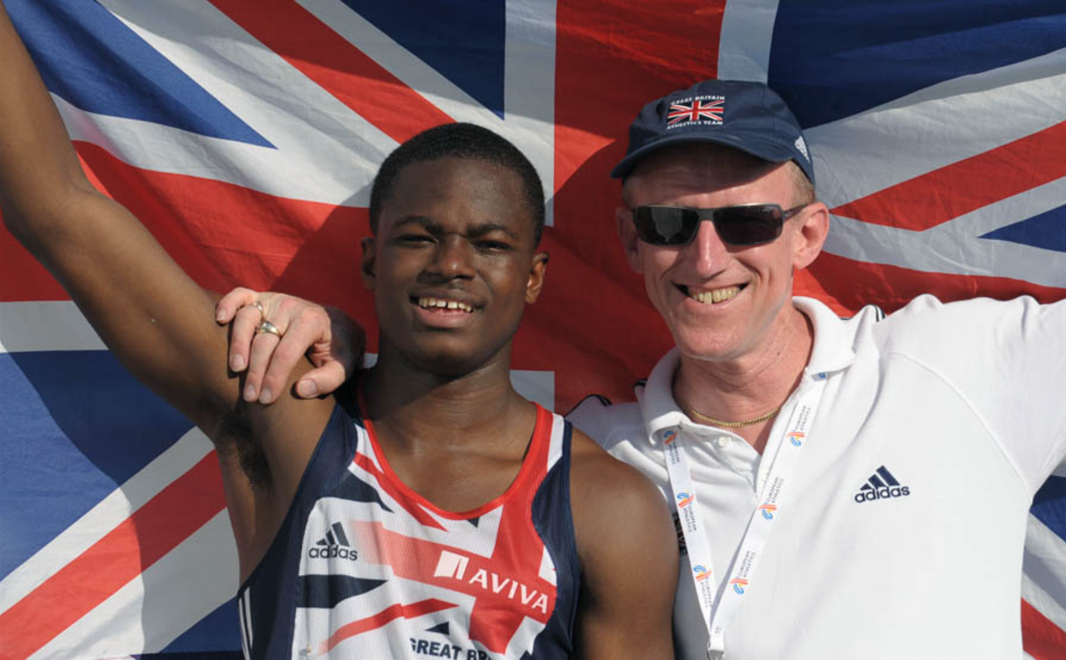From driving lessons to courtrooms to press conferences, this is how interpreters make sport tick – this time in their own words.
It’s an old cliche that sport is a universal language – but that would fall pretty flat without interpreters. Competitions cross borders, continents, and cultures, involving a whole host of moving parts and people who must understand each other for things to run smoothly.
“It’s quite simple, really. Without us, (competitions) couldn’t function,” says Sue Leschen, who interprets between French and English and has worked at elite football and rugby union events.

In layman’s terms, interpreters switch spoken words from one language to another so that people speaking different languages can communicate. At sporting events, this is crucial. Over 200 languages were represented at the 2024 Paris Olympic Games; 62 nationalities were represented in the 2024/25 Premier League season. The sheer number of cultures and languages across elite sport means interpreters are crucial.
“I essentially allow people from two different cultures and who speak different languages to understand each other,” says Lara Fasoli, who interprets between Italian and English speakers. She has worked in American football and tennis, but specialises in football, including the men’s and women’s Champions Leagues and international fixtures.
What do interpreters do in sport?
Journalists and supporters might be used to seeing interpreters in action in interviews or press conferences, but their work expands far beyond that into various behind-the-scenes roles fans might never have thought of. Leschen has worked in the administration side of sport clubs, financial meetings, conversations between clubs and agents, and even interpreting for players in courtrooms. She has even been called upon to interpret for a footballer who needed her services for driving lessons. On Fasoli’s part, as well as work with the media, she has read out security announcements in Italian at Wembley Stadium, shadowed stewards to help them liaise with venue security, and helped associations with organisation and admin.
Their role is varied, unpredictable, and requires a huge degree of legwork. It is never as simple as knowing the language and turning up.
“Sometimes we tend to say, ‘Oh it’s just about words’,” Fasoli says. “It really isn’t, especially in sports.”
“It is very important that as an interpreter, you know how the sport is perceived in both cultures.”
Interpreters don’t just switch sentences into a new language word-for-word; their role is to ensure meaning comes across properly. Fasoli gives an example: “Football language is very much in Italy charged with almost like warlike metaphors and words, and it’s just not how it works in English. It would sound confrontational, it would sound a bit out there, a bit too much – so you have to translate it to what would be appropriate for an English audience.”
Sports interpreters don’t just need to know the language; they need to truly, deeply understand the sport. Fasoli says knowing the terminology is a key part of this – for instance, to make sure everyone in the room understands exactly what a manager means when discussing tactics in a post-match press conference.
“We don’t translate words. We translate meaning. And therefore we can just like take a bit away here and away there – but the meaning is always there. You have to be on point. You have to be precise. There’s no hesitation allowed at all.
“You can repeat the words, but if you don’t know what they mean, it’s very difficult for you to convey what’s being said.”
That’s why Leschen and Fasoli both emphasise the importance of actually watching the game when on media duties afterwards. Leschen recalls one manager telling her to relax and have a coffee in the bar during the game; she had to politely decline. “I really need to see the game! I need to know what’s happening so that I can interpret properly, so it’s in my head for afterwards.”
“I always say a good interpreter is a prepared interpreter. The way we perform, we make it look easy, but it’s not.”
Pressers with managers or players are a particularly high-pressure environment, Leschen admits.
“It’s actually quite difficult to prepare for those kinds of events. There will be obvious questions that you can predict – what did you think of the score? How did you think such and such player played today? Do you think you could have done better?
“But there could be comments and questions around maybe a proposed transfer to another club and finance and issues like that. So preparation is really vital so that you know as much as you can possibly know about that particular player before you go in.
“There’s a lot of pressure on because this is going to probably end up in the news tonight or tomorrow. You’ve got to get it right.”
In press conferences, interpreters have to stay calm – even if things get heated. Fasoli tells Sidelines: “You mirror what the situation is in the room. If your speaker is angry, you will be angry.”
“As an interpreter, you learn to separate yourself almost from the rest of the room. So, you know that it’s not because of you – they’re not yelling at you!”
Dealing with big personalities can be tough. Leschen says there are certainly “prima donnad” in the sports world, and recalls being asked last-minute by a player’s agent to work on Boxing Day and having to decline. But Fasoli says on the whole she finds sport a friendly environment.
“I’ve always found that managers at the pressers, they always turn around and say thank you very much. Gareth Southagte was a real gentleman!”
An interpreter’s matchday…
Lara Fasoli takes us through what a matchday might look like for an interpreter at a football game.
The day before the match: Arrive in time for the MD-1 press conferences, where an interpreter is key if there are journalists from multiple countries.
Matchday, before kickoff: For UEFA games, the interpreter might have to arrive earlier to help the UEFA delegation check the stadium. If not, they arrive about half an hour before the match to check in with the press officer and find their seat
During the game: Pay attention! “It’s very important that you watch the game because otherwise you don’t know what’s being said afterwards through the presser,” Fasoli says.
Post-match: “As soon as the game ends, you go back into the media room and you wait for the two teams and the two managers to be ready to come out for the post-match presser.”
“I would say definitely (a perk is) seeing people that you saw on the telly from up close and actually having some kind of interaction with them,” Fasoli says.
“I’m meeting all these people that normally most people would only see on the TV. So it’s a very glamorous world,” Leschen says. She is happy for those interested in the industry to contact her.
Interpreters might not be the famous faces in sport – but it’s their voices that allow fans around the world to connect to the teams and individuals they love.
Sidelines Recommends

Creating in chaos: the man behind the graphics at Sky Sports
Sky Sports is one of the UK’s breaking sports news powerhouses – but it’s not just the pundits on screen who make it happen. Each transfer and tribute needs visuals carefully curated, which is where Liam Harrison comes in. Graphic designer feels a small word for what…

On the frontline of fairness: Olympics anti-doping
An anti-doping personnel tells Sidelines what it’s like to travel the world and meet top athletes – all in the name of Olympic integrity.

“I was given four to six months to live”: athletics coach John Powell’s story
Whether it’s shaping future Olympians or them helping save his life, athletics coach John Powell MBE proves coaching doesn’t stop at the finish line.




